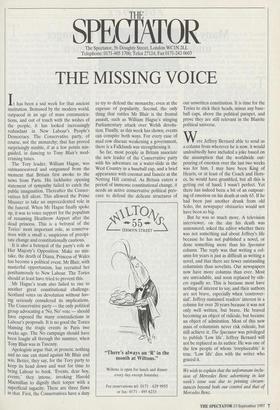SPECt E ATOR The Spectator, 56 Doughty Street, London WC1N 2LL Telephone:
0171-405 1706; Telex 27124; Fax 0171-242 0603
THE MISSING VOICE
It has been a sad week for that ancient institution. Bemused by the modern world, outpaced in an age of mass communica- tions, and out of touch with the wishes of the people, it has looked increasingly redundant in New Labour's People's Democracy. The Conservative party, of course, not the monarchy; that has proved surprisingly nimble, if at a few points mis- guided, in dancing to Tony Blair's mod- ernising tunes. The Tory leader, William Hague, was outmanoeuvred and outgunned from the moment that Britain first awoke to the news from Paris. His lacklustre opening statement of sympathy failed to catch the public imagination. Thereafter the Conser- vatives fell silent. This allowed the Prime Minister to take an unprecedented role in the funeral. When Mr Hague finally spoke up, it was to voice support for the populism of renaming Heathrow Airport after the dead princess. This is a betrayal of the Tories' most important role, as conserva- tives with a small c, suspicious of precipi- tate change and constitutionally cautious.
It is also a betrayal of the party's role as Her Majesty's Opposition. Make no mis- take, the death of Diana, Princess of Wales has become a political event. Mr Blair, with masterful opportunism, has recruited her posthumously to New Labour. The Tories should at least have tried to prevent this.
Mr Hague's team also failed to rise to another great constitutional challenge. Scotland votes on devolution without hav- ing seriously considered its implications. The Conservative party — the only political group advocating a 'No, No' vote — should have exposed the many contradictions in Labour's proposals. It is no good the Tories blaming the tragic events in Paris two weeks ago. The No campaign should have been fought all through the summer, when Tony Blair was in Tuscany.
Apologists argue that, at present, nothing and no one can stand against Mr Blair and win. Better, they say, for the Tory party to keep its head down and wait for time to bring Labour to book. 'Events, dear boy, events,' they intone, invoking Harold Macmillan to dignify their torpor with a superficial sagacity. There are three flaws in that. First, the Conservatives have a duty to try to defend the monarchy, even at the expense of popularity. Second, the only thing that rattles Mr Blair is the frontal assault, such as William Hague's stinging Parliamentary attack over Welsh devolu- tion. Finally, as this week has shown, events can conspire both ways. For every case of mad cow disease weakening a government, there is a Falklands war strengthening it.
So far, most people in Britain associate the new leader of the Conservative party with his adventure on a water-slide in the West Country in a baseball cap, and a brief appearance with coconut and fiancée at the Notting Hill carnival. As Britain enters a period of immense constitutional change, it needs an active conservative political pres- ence to defend the delicate structures of our unwritten constitution. It is time for the Tories to stick their heads, minus any base- ball caps, above the political parapet, and prove they are still relevant in the Blairite political universe.
Were Jeffrey Bernard able to send us a column from wherever he is now, it would undoubtedly have included a joke based on the assumption that the worldwide out- pouring of emotion over the last two weeks was for him. I may have been King of Hearts, or at least of the Coach and Hors- es, he would have grumbled, but all this is getting out of hand; I wasn't perfect. Yet there has indeed been a bit of an outpour- ing of emotion on his death at only 65. If he had been just another drunk from old Soho, the newspaper obituaries would not have been so big.
But he was so much more. A television interviewer, on the day his death was announced, asked the editor whether there was not something sad about Jeffrey's life because he has not published a novel, or done something more than his Spectator column. The reply was that writing a col- umn for years is just as difficult as writing a novel, and that there are fewer outstanding columnists than novelists. Our newspapers now have more columns than ever. Most are unreadable, and soon replaced by oth- ers equally so. This is because most have nothing of interest to say, and their authors are not brave, especially when 'controver- sial'. Jeffrey sustained readers' interest in a column for over 20 years because it was not only well written, but brave. He braved becoming an object of ridicule, but became an object of admiration. Most of this new mass of columnists never risk ridicule, but still achieve it. The Spectator was privileged to publish 'Low life'. Jeffrey Bernard will not be replaced as its author. He was one of the few people of whom 'irreplaceable' is true. 'Low life' dies with the writer who graced it.


































































 Previous page
Previous page